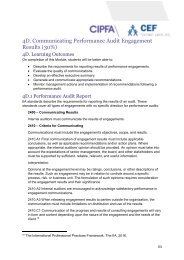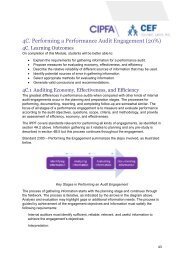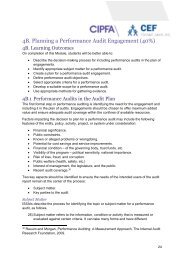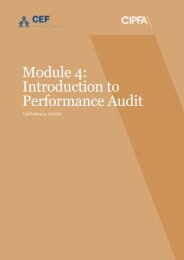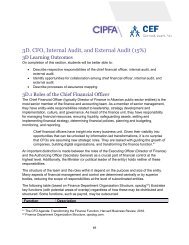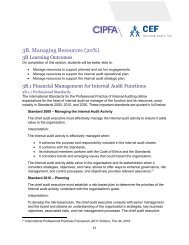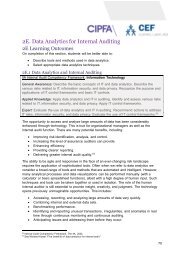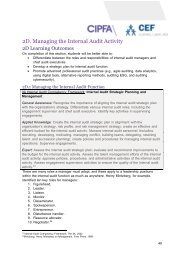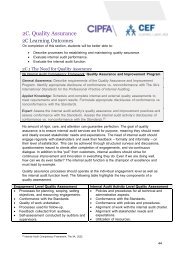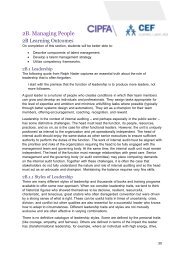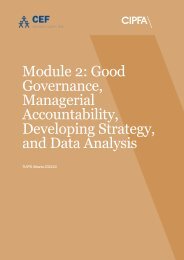TIAPS Module 1 Audit and Assurance workbook
Create successful ePaper yourself
Turn your PDF publications into a flip-book with our unique Google optimized e-Paper software.
To establish individual objectivity requires that auditors have “an impartial, unbiased attitude<br />
<strong>and</strong> avoid any conflict of interest.” This involves adhering to a code of ethics <strong>and</strong><br />
professional st<strong>and</strong>ards, maintaining professional competency, <strong>and</strong> applying due professional<br />
care <strong>and</strong> professional skepticism. It also means auditors must be part of an independent<br />
internal audit function.<br />
The requirements for independence <strong>and</strong> objectivity are summarized below.<br />
Requirements for the Independence of<br />
the Internal <strong>Audit</strong> Function<br />
• Internal audit m<strong>and</strong>ate (as defined in<br />
charter or legislation).<br />
• Access to necessary people, resources,<br />
<strong>and</strong> information.<br />
• Freedom from interference.<br />
• Functional reporting by head of internal<br />
audit to an appropriate level in<br />
organization (ideally governing body).<br />
• Administrative reporting to senior<br />
management (ideally CEO).<br />
• Application of safeguards for<br />
independence when threatened.<br />
Requirements for the Objectivity of<br />
Internal <strong>Audit</strong>ors<br />
• Independence of internal audit function.<br />
• Freedom from conflicts of interest.<br />
• Competency.<br />
• Objective mindset.<br />
• Professional skepticism.<br />
• Due professional care.<br />
• Unwavering integrity.<br />
• Adherence to professional st<strong>and</strong>ards.<br />
• Application of disciplined <strong>and</strong><br />
systematic procedures.<br />
The internal audit m<strong>and</strong>ate <strong>and</strong> charter are discussed in B.2. Independence <strong>and</strong> objectivity –<br />
including the appearance of independence <strong>and</strong> objectivity – are important for the credibility<br />
<strong>and</strong> authority of the internal audit function <strong>and</strong> of individual auditors. It should be clear to<br />
internal <strong>and</strong> external stakeholders that the opinion of the internal audit function is reliable<br />
<strong>and</strong> has not been concocted to suit the personal interests of auditors, managers, or<br />
members of the governing body. Internal audit provides transparency through an unbiased<br />
<strong>and</strong> insightful assessment of past, current, <strong>and</strong> future circumstances. This enables:<br />
• Managers to make well-informed decisions.<br />
• Members of the governing body to exercise oversight <strong>and</strong> intervene where<br />
necessary.<br />
• External stakeholders to trust in reports regarding the organization’s performance,<br />
position, <strong>and</strong> prospects <strong>and</strong> so hold managers <strong>and</strong> leaders to account.<br />
If the internal audit function is not sufficiently independent of management, it becomes<br />
indistinguishable from a second line unit. In this capacity it can provide value but is robbed of<br />
its distinct characteristic. Its authority is subordinated to senior management <strong>and</strong> its scope<br />
<strong>and</strong> capacity potentially limited. The findings <strong>and</strong> recommendations of auditors whose<br />
objectivity is or appears to be impaired can be disregarded or dismissed more easily. Trust is<br />
established on the basis that internal auditors operating outside of the management<br />
structure, <strong>and</strong> there is confidence their recommendations are made in the best interests of<br />
the organization.<br />
28





